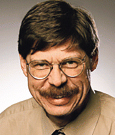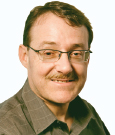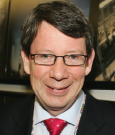The ASCO Annual Meeting is our Society’s premier event and without a doubt one that is highly anticipated by the oncology world. The success of the meeting stems from the desire to share with each other our data and the knowledge we have gleaned from those data over the course of the past year. The diversity of research interests of ASCO members has led to a record-breaking number of nearly 6,000 abstracts this year. Alongside the original research of the Scientific Program is the Educational Program, which provides attendees with a synthesis of emerging data and knowledge. Data and knowledge on one hand and learning on the other are two sides of the same coin.
The theme for ASCO 2015 is Illumination and Innovation: Transforming Data Into Learning. Innovation—the imaginative and creative use of knowledge to transform how we improve the lives of patients in a sustainable and scalable manner—is the necessary companion to illumination. The transformation of data into knowledge, and then knowledge into learning, enables us to move our health-care delivery and research systems forward.
Presenting data and proclaiming that a new standard of care has been created are not learning. Learning involves incorporating new data into a base of knowledge and from that knowledge base developing an understanding of how to apply that knowledge to patient care. Does this treatment benefit all patients equally? Are some patient populations at higher risk for toxicity? How does this treatment compare in effectiveness to other available treatments? What is the overall impact on patient outcomes?
Improving the Value of Cancer Care
These are all questions that help to define what we have truly learned. It is the difference between a statistically significant result and a clinically meaningful result, as described in the article “American Society of Clinical Oncology Perspective: Raising the Bar for Clinical Trials by Defining Clinically Meaningful Outcomes, published last March in Journal of Clinical Oncology.”1 We are all well trained to assess data and determine whether these data justify the knowledge or findings that were described by the authors. We are not as well trained to assess the relative value added.
At last year’s Annual Meeting, discussants were asked to include in their discussions an assessment of where the abstracts’ findings fit into the current body of knowledge and to discuss the overall contribution to improving the value of care. This year’s Annual Meeting will continue on the same path.
Another approach to increasing the learning benefit of the Annual Meeting is to be sure that the Educational Program content reflects the timeliest and rapidly changing subjects that impact the care of patients. Throughout the year, many hundreds of ASCO members work together with ASCO staff and each other to identify and address the problems confronting patients, oncologists, and society today. This year, the Cancer Education Committee, under John V. Cox, DO, MBA, FACP, FASCO, appointed liaisons from ASCO committees to the Cancer Education Committee so that the opinions and knowledge of these ASCO volunteers would be influential in producing the richest selection of educational sessions.
Precision medicine is another example of how we must readjust our approach to learning. Alan P. Venook, MD, Chair of the Scientific Program Committee, and Dr. Cox have codesigned a special series of Molecular Pathways Clinical Science Symposia for the 2015 Annual Meeting. These sessions will not be limited to a disease track but instead will look more broadly at emerging fields of oncology that cut across multiple interests. As both scientific inquiry and clinical care lead us away from anatomic definitions of cancer, it becomes important for both the general oncologist practitioner and the disease-focused oncologist to have exposure to thinking across the spectrum of oncology. These sessions will feature original research from abstracts combined with in-depth discussions describing the work in the context of the session topic.
The session titles are:
- Immunotherapy for Every Patient: Check Your Enthusiasm
- Targeted Therapies: Does the Disease Still Matter?
- New Diagnostics: When “Actionable” Is Objectionable
New Features at the 2015 Annual Meeting
New this year will be a redesign of the Poster Discussion Session to allow for more engagement with attendees. The Poster Discussion Session will feature 12 abstracts with in-depth discussion by 4 discussants. Each discussant will have three abstracts to analyze, allowing for more focused and richer commentary. The discussions themselves will take place in dedicated rooms and will feature a podium panel that includes the lead abstract authors. The posters themselves will be on display earlier in the Oncology Professionals Hall with the track’s regular and Trials in Progress posters, streamlining the poster experience for attendees.
An important element of learning is designing health-care delivery systems that deliver our knowledge to all cancer patients, regardless of geography or social circumstances. The majority of newly diagnosed cancer cases and the greater part of cancer deaths occur in low- and medium-resourced countries. Worldwide, cancer is a health care disparity problem, a disease of humanity threatening those who are least able to respond. We must learn how to deliver health care better in low- and medium-resourced countries. In response to that challenge, this Annual Meeting will feature the inaugural Global Oncology Symposium, which will take place Friday afternoon (May 29).
David Kerr, MD, DSc, founding Editor-in-Chief of ASCO’s new Journal of Global Oncology, will deliver a keynote speech, describing his perspective on how this journal will mentor new authors and provide a much needed knowledge source for health-care delivery models in oncology. The Global Oncology Symposium format includes an abstract selected from the Scientific Program; educational presentations on the molecular and clinical characteristics of a selected global health cancer; and a focused discussion on a health-care delivery problem, which this year will be provision of pathology services in low-resourced countries.
Delivering Quality Care at a Sustainable Cost
It is equally important that we learn how to deliver quality cancer care at a sustainable cost in the United States. This year’s Annual Meeting keynote lecture will be from Michael E. Porter, an economist and professor at Harvard Business School, who will speak about the importance of measuring outcomes. Outcomes are the ultimate validation of what we have learned and place the focus of health care on the patient. Lacking outcomes, we cannot evaluate the value of what we do, nor can others understand the value of our profession. Outcomes measurement is absolutely essential to achieve both patient-centric care and affordable, sustainable health care, anywhere in the world. It reminds us that our goal is not the delivery of health care, but the obtainment of the best possible health for our patients.
Drs. Venook, Cox, and I are excited to welcome you to the 2015 Annual Meeting. Please feel free to reach out and say hello to us in the hallways of McCormick Place. ■
Disclosure: Dr Yu is President of ASCO for 2014–2015.
Reference
1. Ellis LM, Bernstein DS, Voest EE, et al: American Society of Clinical Oncology perspective: Raising the bar for clinical trials by defining clinically meaningful outcomes. J Clin Oncol 32:1277-1280, 2014.
Dr. Yu is President of ASCO for 2014–2015 and Director of Cancer Research at Palo Alto Medical Foundation in California.





